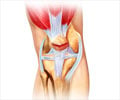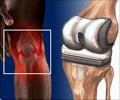A research team at Hospital for Special Surgery, including an Indian-origin scientist, have developed a biodegradable scaffold that can be used to treat patients with
Patients with damaged knee cartilage can hope to be treated with a biodegradable scaffold developed by a research team at Hospital for Special Surgery, including an Indian-origin scientist.
Dr Asheesh Bedi, a fellow in sports medicine and shoulder surgery at Hospital for Special Surgery, has revealed that his team's invention is a Trufit plug that has mechanical properties similar to cartilage and bone."The data has been encouraging to support further evaluation of this synthetic scaffold as a cartilage repair technique," he said.
Damage to so-called articular cartilage can occur in various ways, ranging from direct trauma in a motor vehicle accident to a noncontact, pivoting event on the soccer field.
The Trufit plug has two layers. The top layer has properties similar to cartilage and the lower layer has properties similar to bone.
The bilayered structure has mechanical properties that approximately match the adjacent cartilage and bone.
During the study, surgeons inserted the plug in the knees of 26 patients with donor lesions from OATS procedures and followed up with imaging studies (with MRI and T2-mapping) at various intervals for a period of 39 months.
Advertisement
"We gain knowledge about the biology of integration with the host tissue, as well as the repair tissue biochemistry, all by a noninvasive imaging technique," he added.
Advertisement
The findings were presented at annual meeting of the American Orthopedic Society for Sports Medicine.
Source-ANI
TAN









